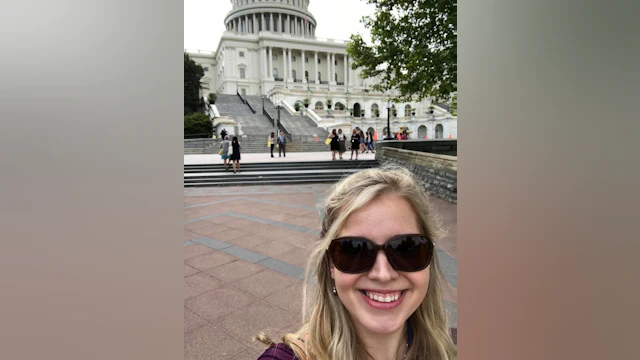Jun. 16, 2020 - After I lost my Aunt Linda to suicide in December 2014, I felt like I needed to do something. Initially, I jumped at the opportunity to help my family members and those close to me in any way that I could. Helping with funeral arrangements, making memorial displays, writing her obituary – if there was anything I could do for my family, I jumped at the opportunity to assist.
In the weeks and months that followed, as our family settled into our new normal, it dawned on me that perhaps these actions I had taken in supporting my other family members – as positive as they had been – had also been a way for me to avoid reckoning with my own grief. It suddenly felt like there was nothing left for me to do to avoid it.
That was when a professor introduced me to our local Out of the Darkness™ Community Walk. These walks, hosted by local chapters of the American Foundation for Suicide Prevention, give those affected by suicide an opportunity to come together with their neighbors in communities nationwide, and walk together to raise awareness and funds, and provide hope and healing.
Walking and fundraising was something active that I could do. Slowly, through action, I began to heal.
After volunteering with my local AFSP Kentucky Chapter for a few months, I was invited to attend the Annual Advocacy Forum in Washington, D.C. This annual event provides volunteer AFSP Field Advocates the opportunity to come together and be the voice for suicide prevention, meeting with federal lawmakers and their staff to encourage them to prioritize smarter mental health policies nationally.
At the time, my knowledge of advocacy started and ended with the School House Rock song “How a Bill Becomes a Law.” I had no idea what I was doing, but I wanted to learn. One of the first things I discovered was that I didn’t need to be an expert, nor did I need to know all the ins-and-outs of how the government works – frankly, I didn’t even need to particularly like politics to get involved. Being open and sharing my story, and that of my aunt, made me a powerful advocate.
We advocated for several bills including the Mental Health Reform Act, which increased funding to critical mental health services, and the Helping Families in Mental Health Crisis Act, which provided families with emergency access to information and better ability to care for a loved one during a mental health crisis. When legislation we had advocated for passed the House Committee unanimously, the very next day, I knew the impact my voice could have.
Advocating for suicide prevention allowed me to shift perspective. Suddenly, my actions weren’t about avoiding my own grief, but about speaking up and sharing my story so that others wouldn’t have to feel the same way. As my confidence grew, I scheduled follow-up meetings with Congressmen.
Years later, I transitioned from my volunteer efforts to become a member of AFSP’s Field Staff, as the Area Director for our chapter in Kentucky. My first priority was organizing a State Capitol Day, where our chapter’s volunteer Field Advocates could meet with legislators on the local level. I knew that we could really make an impact on the legislature, and in our own communities.
My first week on the job, I reached out to two other local suicide prevention groups, which had similar advocacy events, and inquired about joining together. The combined forces of these three groups had an incredible impact. We advocated for two bills: one to create a state fund to provide Mental Health First Aid trainings throughout the state, and the other requiring all student ID’s, from middle school through college, to include the National Suicide Prevention Lifeline and other mental health resources. We met personally with 15 different legislative offices, dropped off resources and education materials to all of Kentucky’s state Senators and Representatives, met with the Governor’s office, and were introduced on the House and Senate floors. Most importantly though, both bills that we advocated for that day have been signed into law.
Advocacy can have a profound impact on an individual, a community, a state, and even a country. Seeing the power of advocating for suicide prevention is what made me first fall in love with AFSP. Moreover, taking action and using my voice to speak for smarter legislation on mental health and suicide prevention has helped me in my own grief journey.
Joining forces with others in our community who also care about suicide prevention helped us form a strong bond. Who knew that politics could actually bring people together! That’s the power of advocating for a cause you truly believe in, of using your voice for those who can’t, and of sharing your story for a greater purpose.
To learn more about AFSP’s advocacy efforts and becoming a Volunteer Field Advocate in your own community, click here.
